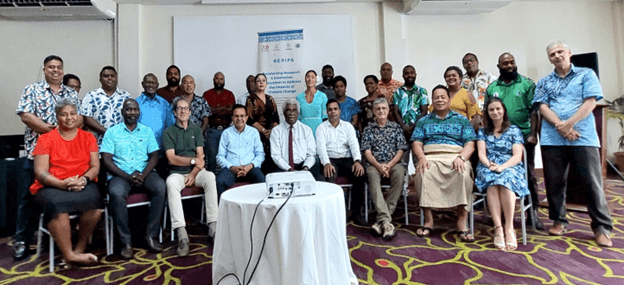Related News

The RERIPA CALL 1 project, focused on the “Mapping & Diagnosis of Research & Innovation Ecosystems, Network Facilitation, and Research & Innovation Strategy,” recently concluded its successful workshop at the Holiday Inn in Port-Vila, Vanuatu, from March 6-8, 2024.
Organised by the consortium partners, the National University of Vanuatu (NUV) and Solomon Islands National University (SINU), the workshop welcomed physical and virtual attendance from The University of the South Pacific (USP) staff.
The event was a pivotal component of the RERIPA (Strengthening Research and Innovation ecosystems to address the Impact of climate change in the Pacific) project, funded by the European Union and collaboratively implemented by the French Research Institute for Development (IRD), Pacific Islands Development Forum (PIDF), Pacific Islands Association of Non-governmental Organisations (PIANGO), and Vanuatu Meteorology and Geo-Hazards Department (VMGD).
As the lead institution for the project, USP, co-chair of the Pacific Islands Universities Regional Network (PIURN), under the direction of Professor Maurizio Cirrincione, partnered with a strong team, including NUV, SINU, USP Cook Islands and Tonga Campuses, Engineers Fiji, the Pacific Community (SPC), PACPATH, and the University of New Caledonia.
The workshop, co-organised by NUV and SINU, delved into the Call 1 Objectives, aiming to improve the knowledge and understanding of Research & Innovation (R&I) Ecosystems at both national and regional levels, facilitate interactions between civil society, private sector, government bodies, scientists, and academics, and build a shared Research & Innovation vision and strategy in the Pacific Region. Participants included Call 1 partners, government representatives, research institutes, NGOs, and various stakeholders from Vanuatu.
Mr Jean-Pierre Nirua, Vice-Chancellor of NUV, emphasised the importance of shared knowledge, experience, technology, and innovation among key stakeholders to minimise climate change impacts and strive towards livelihood for Pacific Islanders in the era of climate change.
Professor Sushil Kumar, USP Director of Research, highlighted the significance of research collaboration in the region and provided valuable insights on Research and Innovation on how RERIPA CALL 1 falls within the United Nations Sustainable Development Goals and 2050 Strategy for the Blue Pacific Continent.
He also stated how the project will address the shared R&I vision and strategy in the Pacific and strengthen a network of various Pacific stakeholders, working to enhance collective tools and processes to face Climate Change Impact.
The attendees collaboratively presented initial findings from their mapping endeavours and survey findings, striving to comprehend the existing Research and Innovation (R&I) Ecosystem in the Pacific region. Deliberations also revolved around establishing connections between the 2050 Strategy for the Blue Pacific Continent and the forthcoming R&I Strategy, leveraging insights gained from mapping the Pacific R&I ecosystem and the RERIPA Survey.
Dr Eric Katovai, Acting Pro-Vice-Chancellor Education of SINU, offered an insightful presentation on contextualising Climate Change Impacts approaches in the region with Traditional Knowledge, emphasising the importance of intangible cultural heritage in research methodologies in the Pacific.
The workshop concluded with a field trip around the island of Efate, where we visited Tagabe Agriculture station to illustrate climate change adaptation and Pangpang Village to understand climate change adaptation and mitigation through nature-based agriculture.
For any information on Call 1 – RERIPA Project, contact Mr Albert Whippy, Call 1 Coordinator– albert.whippy@usp.ac.fj